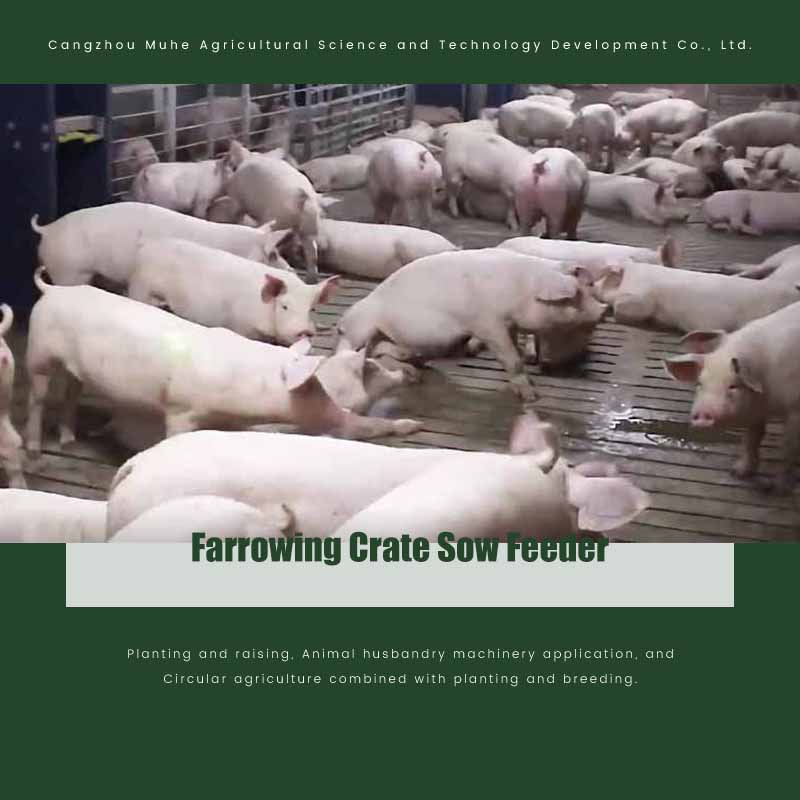Farrowing crate sow feeders are a crucial element in modern pig farming. These feeders are designed to ensure that sows receive adequate nutrition during the farrowing process, promoting their health and the well-being of their piglets.
Importance of Farrowing Crate Sow Feeders
The importance of farrowing crate sow feeders cannot be overstated. They provide sows with consistent access to food, ensuring they remain healthy and strong throughout the farrowing period. Proper nutrition during this time is essential for the sow's recovery and the growth of her piglets. Additionally, these feeders help minimize feed waste and promote efficient feeding practices.
Types of Farrowing Crate Sow Feeders
1. Manual Feeders
Manual feeders require farmers to refill them regularly. They are simple to use and cost-effective but may require more labor and time.
2. Automatic Feeders
Automatic feeders dispense food at set intervals, ensuring consistent feeding without the need for constant monitoring. They are more expensive but save time and reduce labor costs.
3. Ad Libitum Feeders
Ad libitum feeders allow sows to eat whenever they want, providing constant access to food. This type of feeder helps ensure that sows can maintain their nutritional intake according to their needs.
Materials Used in Farrowing Crate Sow Feeders
1. Stainless Steel
Stainless steel feeders are durable, easy to clean, and resistant to corrosion. They are ideal for maintaining hygiene and longevity.
2. Plastic
Plastic feeders are lightweight, easy to install, and cost-effective. They are suitable for smaller operations or as temporary solutions.
3. Composite Materials
Feeders made from composite materials combine the benefits of both plastic and stainless steel, offering durability and ease of maintenance.
Benefits of Using Farrowing Crate Sow Feeders
1. Improved Health and Nutrition
Consistent access to food ensures that sows receive the necessary nutrients, promoting their health and the growth of their piglets.
2. Reduced Feed Waste
Designed to minimize spillage and waste, these feeders help in efficient feed management, reducing overall feed costs.
3. Labor Efficiency
Automatic and ad libitum feeders reduce the time and labor required for feeding, allowing farmers to focus on other critical tasks.

Installation of Farrowing Crate Sow Feeders
1. Pre-installation Preparation
Proper preparation is essential for the successful installation of sow feeders. This includes selecting the appropriate feeder type, ensuring the area is clean, and having the necessary tools on hand.
2. Step-by-Step Installation Guide
Choose the Location: Select a suitable location within the farrowing crate where the feeder will be accessible to the sow.
Install Supports: Secure the supports or brackets that will hold the feeder in place.
Attach the Feeder: Mount the feeder onto the supports, ensuring it is firmly secured.
Test the Feeder: Fill the feeder with a small amount of feed to test its functionality and ensure there are no leaks or issues.
3. Post-installation Checks
Conduct thorough checks after installation to ensure the feeder is properly secured and functioning as expected. Inspect for any potential hazards or malfunctions.
Case Studies
1. Successful Implementation in Large-Scale Farms
Large-scale farms have successfully implemented farrowing crate sow feeders, observing significant improvements in sow health, reduced labor, and better feed management.
2. Small-Scale Farm Experiences
Small-scale farmers have also benefited from using these feeders, finding them cost-effective and easy to maintain, demonstrating their versatility and efficiency.
Implementation of farrowing crate sow feeders represents a significant advancement in pig farming. These feeders ensure consistent nutrition, reduce feed waste, and save labor, making them an essential tool for modern pig farming operations.
Hot tag:
Adjustable Pig Farrowing Crate

